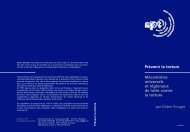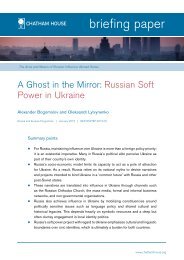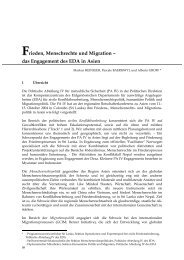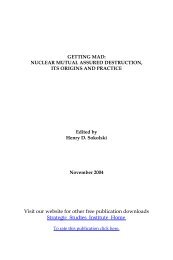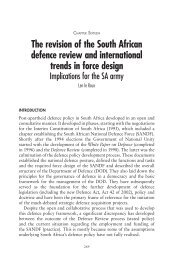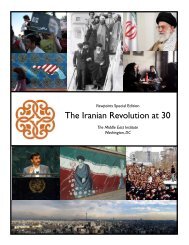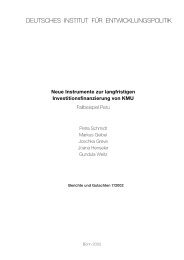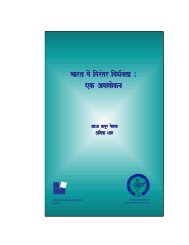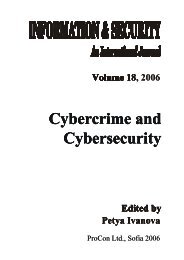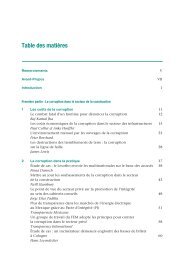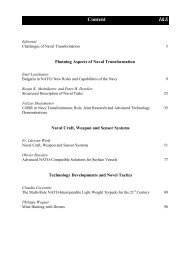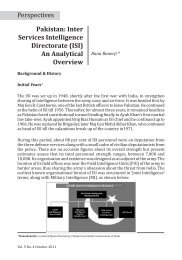Andreas Stamm Eva Dantas Doris Fischer Sunayana ... - ETH Zürich
Andreas Stamm Eva Dantas Doris Fischer Sunayana ... - ETH Zürich
Andreas Stamm Eva Dantas Doris Fischer Sunayana ... - ETH Zürich
Create successful ePaper yourself
Turn your PDF publications into a flip-book with our unique Google optimized e-Paper software.
34<br />
<strong>Andreas</strong> <strong>Stamm</strong> et al.<br />
ternational as well as local markets. Contrary to what has happened in the case of earlier<br />
success stories (Korea, Taiwan), market liberalisation today does restrict selective<br />
infant industry protection policies or market reservation policies.<br />
— International regulations also affect the possible ways and forms in which technologically<br />
relevant knowledge is appropriated. For instance, stricter IPR protection regimes<br />
severely restrict the options for reverse engineering and copycat strategies.<br />
— The scope for technology and innovation policy is also affected by other new “rules<br />
of the game” established within the World Trade Organization (WTO) framework. Instruments<br />
of industrial policy, common in many developing countries in the past,<br />
have largely been ruled out, including efforts to link local companies to Foreign Direct<br />
Investment (FDI) by imposing local content requirements.<br />
On the other hand, the shift towards a globalising knowledge economy also opens up new<br />
opportunities for countries in the process of catching up, and these were not equally<br />
available for early movers:<br />
— Technology development and innovation can fall back on huge stocks of available<br />
information and knowledge, in part in the public domain and accessible through ICT.<br />
— Technology corporations are increasingly relocating knowledge-intensive activities to<br />
some developing countries, either in order to access human resources or to be present<br />
where demand for technology-based products is growing at a rapid pace.<br />
— Research organisations and companies in developing countries have the opportunity<br />
to tap into global networks (e.g. in the context of EU Framework Programmes) and/or<br />
to contract specialised human resources, allowing them to access high-end know-how<br />
and merge it with locally generated knowledge.<br />
— Developing countries can learn from experiences in OECD countries regarding effective<br />
technology policy and instruments, thus shortening learning processes and minimising<br />
the risks of costly innovation policy failures.<br />
Comparison of these two bodies of argument, gives rise to some important research questions.<br />
Does globalisation make the formation of IS easier or more difficult? Do pathways<br />
exist to short-cut learning processes and the related build-up of technological<br />
capabilities? Do the changes in framework conditions impact on the specific features<br />
of IS in anchor countries, e.g. in terms of the mix of national and international access<br />
to specific knowledge?<br />
SoIS formation in anchor countries: a promising approach to catching technologically?<br />
We may conclude from the innovation system literature that anchor countries may enjoy<br />
some advantages in the development of sustainability-oriented innovations, or at least<br />
that the possibility for technological catching-up may be greater here than in more commercial<br />
technologies:<br />
— Technological learning is a cumulative process. This implies that the lead of industrialised<br />
countries is very significant in old industries, especially where different fields<br />
of expertise need to be combined in developing a new artefact (e.g. in the automotive<br />
industry). In sustainability innovations, the underlying core technologies are often still<br />
in flux (e.g. non-silicon-based photovoltaics) or rather simple (wind turbines), lowering<br />
the entry barriers for latecomers.<br />
German Development Institute / Deutsches Institut für Entwicklungspolitik (DIE)



